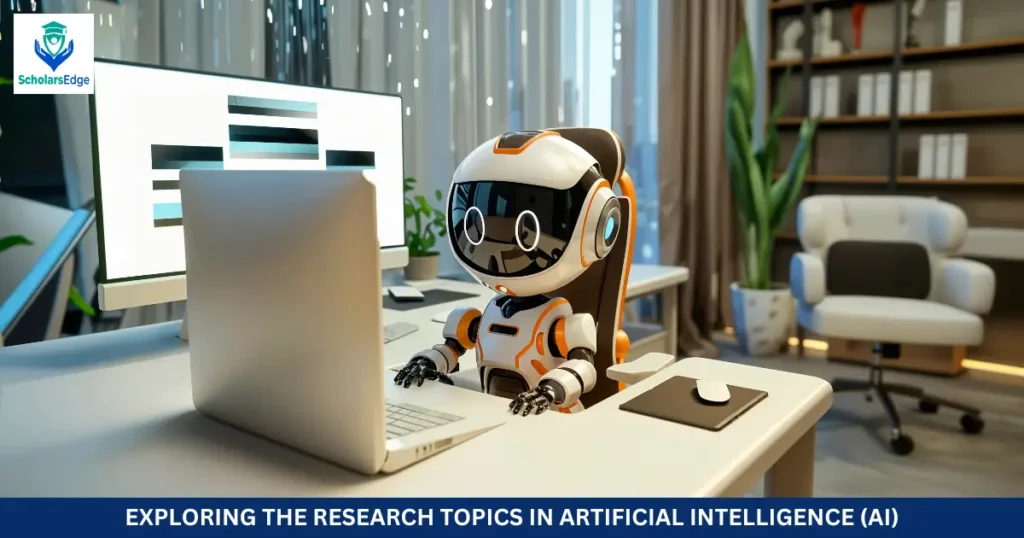
Artificial Intelligence (AI) is transforming various sectors, pushing boundaries, and opening new avenues for innovation. Staying updated with the latest advancements in AI is crucial for leveraging its potential to solve complex problems and drive progress. This blog explores some cutting-edge areas in AI research, including self-supervised learning, AI in climate science, robustness in AI, AI for human augmentation, and AI applications in legal technology. You can prepare your research questions and hypotheses based on the given topics. The list of trending research topics in AI is as follows:
| No. | Topic | Descriptions |
| 1 | Explainable AI | Enhancing transparency and interpretability of machine learning models, especially in critical applications like healthcare, finance, and legal systems |
| 2 | Federated Learning | Developing algorithms to train machine learning models across multiple decentralised devices while maintaining data privacy |
| 3 | Meta-Learning | Creating algorithms that can “learn how to learn” with minimal data |
| 4 | Multi-Modal Learning | Integrating various data modalities (e.g. text, images, audio) into a single robust learning model |
| 5 | Energy-Efficient Algorithms | Designing AI algorithms that require less computational power crucial for edge computing and sustainability |
| 6 | Neurosymbolic Methods | Combining neural networks with symbolic reasoning to improve data-driven and rule-based learning |
| 7 | Human-in-the-loop | Approaches for incorporating human expertise and feedback into machine learning models |
| 8 | Self-Supervised Learning | Developing algorithms that can learn valuable representations from unlabeled data |
| 9 | Climate Science | Using machine learning to model climate change, forecast natural disasters, and improve renewable energy sources |
| 10 | Neuroscience | Exploring how machine learning can decode the brain and how neuroscience can inspire new algorithms |
| 11 | NLP in Mental Health | Detecting and monitoring psychological disorders using natural language processing on textual or spoken data |
| 12 | Quantum Computing | Analysing the impact of quantum computing on machine learning algorithms |
| 13 | Supply Chain Management | Improving logistics, predictive maintenance, and inventory management through AI |
| 14 | AI in Commercial Banking | Applying AI technology to enhance operations and decision-making in commercial banks |
| 15 | AI in Industrial Automation | Designing automation systems in industrial production using AI techniques |
| 16 | AI and Blockchain in Finance | Exploring the confluence of AI and blockchain-powered smart contracts in financial systems |
| 17 | AI in Education | Developing intelligent information systems and computer evaluation models for classrooms |
| 18 | AI in Power Systems | Implementing safety risk control systems for electric power construction sites using AI |
| 19 | AI Chatbots for Equality | Designing AI-powered chatbots to promote equality in high school advising |
| 20 | AI for Diagnosis | Using explainable AI techniques for leprosy diagnosis |
| 21 | AI in Industrial Inspection | Identifying and classifying industrial elements using AI and image processing |
| 22 | AI in Motor Fault Diagnosis | Leveraging AI algorithms for load fault diagnosis in induction motors |
| 23 | Medical XAI | Surveying the state-of-the-art in explainable AI (XAI) for medical applications |
| 24 | AI for Data Visualization | Investigating AI approaches to enhance data visualisation |
| 25 | AI in Radiology | Analysing the use of AI to detect workload-related changes in radiologists’ gaze patterns |
| 26 | AI in Surgery | Exploring the application of AI for emerging technologies in surgical procedures |
| 27 | AI for Opioid Prediction | Comparing the effectiveness of AI and existing models for predicting opioid use disorder |
| 28 | AI for HIV Prediction | Identifying HIV-1 Vif protein attributes associated with CD4 T cell counts and viral loads using AI |
| 29 | AI and 5G Integration | Analysing the integration of 5G communication technology with artificial intelligence |
Self-Supervised Learning
Self-supervised learning is a paradigm that has gained significant traction in recent years. Unlike traditional supervised learning, which relies on labelled data, self-supervised learning enables models to learn from vast amounts of unlabeled data. This approach is particularly beneficial given the time-consuming and expensive nature of data labelling.
Concept and Advantages
Self-supervised learning involves creating auxiliary tasks from raw data that serve as supervision. For example, predicting the next word in a sentence or the missing part of an image can help the model learn helpful representations. The main advantages of this approach include:
- Efficiency: Reduces the dependency on labelled data.
- Scalability: Facilitates learning from large datasets without manual intervention.
- Generalization: Enhances the model’s ability to generalise to new tasks.
Research Areas
Contrastive Learning
Contrastive learning aims to learn representations by distinguishing between similar and dissimilar data points. Techniques like SimCLR and MoCo have demonstrated impressive performance in visual tasks by leveraging this principle.
Representation Learning
Representation learning focuses on learning useful features from data that can be applied to various downstream tasks. Self-supervised methods like BERT in natural language processing and CLIP in vision-language tasks have set new benchmarks in their respective fields.
Pre-Training Techniques
Pre-training involves training a model on a large dataset to capture general features, which can then be fine-tuned on a smaller, task-specific dataset. This approach has proven effective in natural language processing and computer vision, enabling state-of-the-art performance on multiple benchmarks.
AI in Climate Science
AI plays a crucial role in addressing the global challenge of climate change. AI can help develop sustainable solutions and mitigate environmental impact by providing advanced data analysis and modelling tools.
Climate Modeling
Climate modelling involves simulating the Earth’s climate system to predict future conditions. AI techniques, particularly deep learning, are improving the accuracy of these models by incorporating vast datasets from various sources, such as satellite imagery and sensor networks.
Environmental Monitoring
AI-powered systems can monitor environmental changes in real-time. For example, machine learning algorithms analyse data from sensors and satellites to detect deforestation, track wildlife, and monitor air and water quality.
Sustainable Solutions
AI contributes to developing sustainable solutions by optimising energy consumption, enhancing renewable energy systems, and reducing waste. AI-powered smart grids are more efficient and can integrate renewable energy sources more effectively, reducing carbon footprints.
Robustness in AI
Ensuring that AI models are reliable and robust is essential for their deployment in real-world applications. Research in this area focuses on enhancing models’ resilience to various uncertainty and errors.
Model Robustness
Model robustness refers to the ability of AI systems to maintain performance despite changes or disruptions in input data. Techniques such as adversarial training and robust optimisation are being developed to improve this aspect.
Uncertainty Quantification
Uncertainty quantification involves measuring and managing the uncertainty in AI model predictions. Bayesian methods and ensemble learning are commonly used to provide probabilistic estimates, which help make informed decisions under uncertainty.
Error Correction
Error correction techniques aim to identify and correct mistakes made by AI models. Self-correcting algorithms and feedback loops are being designed to enhance the reliability and accuracy of AI systems, particularly in critical applications like healthcare and autonomous driving.
AI for Human Augmentation
AI is significantly enhancing human capabilities, leading to breakthroughs in various fields. From brain-computer interfaces to augmented reality, AI-driven technologies augment human abilities and improve quality of life.
Brain-Computer Interfaces
Brain-computer interfaces (BCIs) enable direct communication between the brain and external devices. AI algorithms decode neural signals to control prosthetics, assistive devices, and even computers, offering new possibilities for individuals with disabilities.
Augmented Reality
Augmented reality (AR) overlays digital information in the real world, enhancing human perception and interaction. AI-powered AR applications are used in education, training, healthcare, and entertainment, providing immersive and interactive experiences.
Assistive Technologies
AI-driven assistive technologies are designed to support individuals with disabilities. Speech recognition, computer vision, and natural language processing enable the development of tools that assist with communication, mobility, and daily activities, promoting independence and inclusion.
AI and Legal Tech
The legal industry increasingly adopts AI to streamline processes, improve efficiency, and enhance decision-making. AI applications in legal tech are transforming how legal professionals work and deliver services.
Legal Document Analysis
AI systems can accurately analyse legal documents, extract relevant information, and identify key insights. Natural language processing techniques automate document review, contract analysis, and due diligence, saving time and reducing costs.
Predictive Legal Analytics
Predictive legal analytics uses AI to forecast legal outcomes based on historical data. Machine learning models analyse past cases and decisions to predict the likelihood of success in litigation, helping legal professionals make informed strategic decisions.
Regulatory Compliance
AI assists in ensuring regulatory compliance by automating the monitoring and analysis of regulations. Compliance tools powered by AI can identify potential risks, suggest corrective actions, and keep track of regulatory changes, reducing the burden on legal teams and minimising compliance risks.
Conclusion
The frontiers of AI research are vast and dynamic, offering numerous opportunities to address complex challenges and improve various aspects of life. From self-supervised learning and climate science to robustness, human augmentation, and legal tech, AI drives innovation and creates new possibilities. Engaging in these cutting-edge research areas advances the field of AI and contributes to solving some of the most pressing issues facing society today. Researchers, practitioners, and enthusiasts are encouraged to explore and contribute to these exciting domains, shaping the future of AI and its applications.
FAQs on Research Topics in Artificial Intelligence (AI)
What are interesting topics in artificial intelligence?
Explainable AI, to enhance the transparency of machine learning models; Federated Learning, for training models across devices while preserving privacy; Meta-Learning, to create algorithms that can “learn how to learn”; Multi-Modal Learning, integrating diverse data modalities; Energy-Efficient Algorithms, designing AI systems with lower computational requirements; Neurosymbolic Methods, combining neural networks and symbolic reasoning; and Human-in-the-loop approaches, incorporating human expertise into machine learning. These topics span a range of AI subfields with real-world applications and practical implications.
Can you provide AI research topics for beginners?
Chatbots and virtual assistants, computer vision and image processing, natural language processing, predictive analytics and forecasting, recommendation systems, anomaly detection, robotics and automation, healthcare applications, generative models, and reinforcement learning are topics that cover a range of AI subfields with practical applications suitable for beginners to gain hands-on experience.
What are the topics related to artificial intelligence for research?
Explainable AI, Federated Learning, Meta-Learning, Multi-Modal Learning, Energy-Efficient Algorithms, Neurosymbolic Methods, Human-in-the-loop, Self-Supervised Learning, Climate Science, Neuroscience, NLP in Mental Health, Quantum Computing, Supply Chain Management, Commercial Banking, Industrial Automation, Blockchain in Finance, Education, Power Systems, Diagnosis, Industrial Inspection, and Motor Fault Detection.
